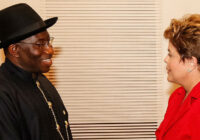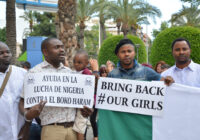President-elect Muhammadu Buhari has his work cut out for him in Nigeria.
Nigerians have chosen Gen. Muhammadu Buhari, a former military ruler, to be their new president. Following an election that saw 41 people killed in northern Nigeria, incumbent President Goodluck Jonathan conceded defeat and congratulated Buhari on his victory.
Buhari’s military regime that ruled from 1983-85 was draconian. He systematically repressed freedom of expression through the jailing of journalists, radical public intellectuals and student protesters. He now says that “the global triumph of democracy has shown that another and a preferable path to change is possible.”
Nigerians and the international community will be watching to see whether this time around Buhari works for the common good in Nigeria.
Corruption and Crisis
The general political and economic situation in Nigeria is problematic. Nigeria is home to a corrupt government. According to Transparency International, Nigeria is ranked at 136th out of 175 states in terms of perceptions of corruption.
Women are underrepresented in political affairs. Until now, the House of Representatives had only one female principal officer, and only 7% of the 362 members were women. The House of Representatives committee on women has called for more participation from women in the nation’s politics. We will now see if the new government responds to this demand.
The economy is in crisis. Nigeria has an unhealthy dependence on its oil exports, which represent more than 80% of its national income. There has now been a drop in oil prices, which means that public sector jobs will have to be cut; 24% of Nigerians are unemployed. Nigeria must double its investment in infrastructure, and improve its power sector, the water and sanitation sector, its road networks, and its air transport safety.
Nigeria has to be serious about health. The World Health Organization recommends that governments spend 15% of their budget on health, but Nigeria spends only 6% of its budget. Nigeria had 40,000 pregnancy-related deaths a year account for approximately 14% of the world’s total in 2012.
Northern Exposure
The situation in northern Nigeria is critical. Since 2014, more than 6,000 civilians have been killed by Boko Haram. Around 1 million Nigerians have been forcibly displaced within the country, and 200,000 have fled to Cameroon, Niger or Chad. Colonel Joseph Nouma of the Maroua Defense Regiment in the Nigerian army told the IRIN news service: “When you go to border villages, all you see are women and children and old people. Young [men], between the ages of ten and 45 are no longer there. They are across the [Nigerian] border with Boko Haram militants.”
In the north, regional actors have been more active than the Nigerian government in fighting Boko Haram. With the approval of the African Union, Nigeria and its neighbors — Chad, Niger, Cameroon and Benin — have deployed a 8,700-strong Multi-National Joint Task Force (MNJTF) to fight around 4,000-6,000 Boko Haram Islamist militants.
Presidents from the Economic Community of Central African States (ECOWAS) pledged in early 2015 to create an $87 million emergency fund for military, medical and logistical support for the MNJTF. Nigeria’s current president, Goodluck Jonathan, expects Boko Haram to be defeated within a month. However, even with the presence of regional allies, Boko Haram is likely to go into hiding and conduct a guerrilla campaign.
Past Policy Vacuum
The way the government has addressed violence in the north has been abysmal: Very few measures have been taken. Muslim clerics identified a lack of good governance as the primary reason Boko Haram succeeded in recruiting members. According to a US official, “They warned that similar crises would occur if the government failed to address social problems.”
In terms of social measures, when Boko Haram started fighting in 2009, a “societal reorientation program” was created in the north. However, according to one US official, this initiative only made it possible for Boko Haram to “recruit more members” as it had no impact on the population’s well-being.
Military action against Boko Haram has been deplorable, probably because Boko Haram had clear connections to the government. The Nigerian army committed serious human rights violations in its response to the terrorist organization. Hundreds of civilians and suspected Boko Haram members have been killed, and detainees have died in military custody.
In 2015, President Jonathan’s national security adviser, Sambo Dasuki, only mentioned the creation of a single social policy — in Kuje prison in the capital Abuja, which aims at deradicalizing former insurgents. The new Buhari government will have to develop social policies to reduce inequalities in order to prevent further violence.
The Economy
The economic involvement of the Nigerian government is inadequate. Only half of the investment projects in the north were completed in 2014. In 2015, the government created a $133 million emergency fund for the north in order to finance 94 different projects such as road construction, railways, energy and agriculture, but the precise use of this fund remains to be seen.
The new president will have to address three long-standing and critical issues in the north: economic development, education and health. Economic development is needed to counter Boko Haram, which is paying men around $700 a month to join its ranks.
The new government must tackle the difficult issue of unemployment which, among all age groups, is at least 75%. Many young people, especially recent graduates, say it is impossible to find decent work. For the few who do have a job, the minimum wage is $70 a month. The new government will also have to address the lack of economic resources and food in the north.
Education
The new Nigerian government will have to prioritize education. When Boko Haram started attacking civilians in 2009, it was known to oppose “Western education models.” However, young men fighting for Boko Haram could not have had much knowledge of education. In 2011, in northern Nigeria, half of the men had no education at all, only 7% completed primary education and only 6% completed secondary education.
Education in the north should, therefore, be a priority for the new government. This is important not only for men, but it is also essential for women. In 2011, 65% of women had no education, 6% completed primary education and 3% completed secondary education.
Health
The new president will be held accountable for improving health in the north, as clinics are under-staffed and women are ten times more likely to die in childbirth than in the south.
With these conditions, Boko Haram filled a vacuum. The militants will now be much harder to remove, but ultimately, the next government can take steps to start tackling the problems that allowed the group to gain a foothold.
*[This article was originally published by The Conversation.] ![]()
The views expressed in this article are the author’s own and do not necessarily reflect Fair Observer’s editorial policy.
Photo Credit: Clara Sanchiz / Chatham House / Flickr
 We bring you perspectives from around the world. Help us to inform and educate. Your donation is tax-deductible. Join over 400 people to become a donor or you could choose to be a sponsor.
We bring you perspectives from around the world. Help us to inform and educate. Your donation is tax-deductible. Join over 400 people to become a donor or you could choose to be a sponsor.
Support Fair Observer
We rely on your support for our independence, diversity and quality.
For more than 10 years, Fair Observer has been free, fair and independent. No billionaire owns us, no advertisers control us. We are a reader-supported nonprofit. Unlike many other publications, we keep our content free for readers regardless of where they live or whether they can afford to pay. We have no paywalls and no ads.
In the post-truth era of fake news, echo chambers and filter bubbles, we publish a plurality of perspectives from around the world. Anyone can publish with us, but everyone goes through a rigorous editorial process. So, you get fact-checked, well-reasoned content instead of noise.
We publish 2,500+ voices from 90+ countries. We also conduct education and training programs
on subjects ranging from digital media and journalism to writing and critical thinking. This
doesn’t come cheap. Servers, editors, trainers and web developers cost
money.
Please consider supporting us on a regular basis as a recurring donor or a
sustaining member.
Will you support FO’s journalism?
We rely on your support for our independence, diversity and quality.








Comment